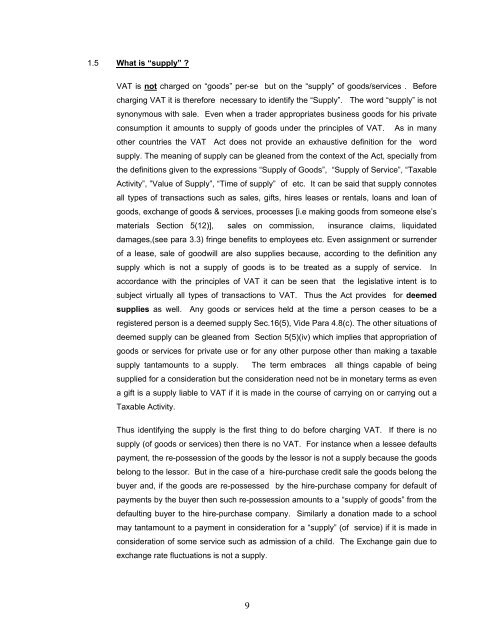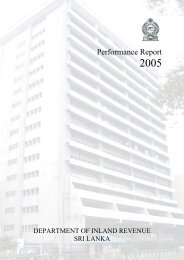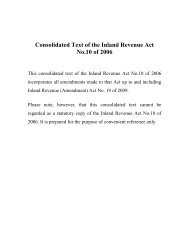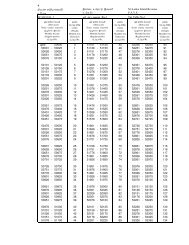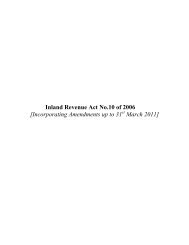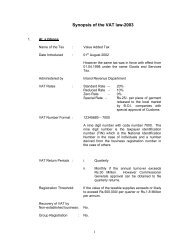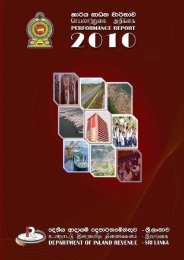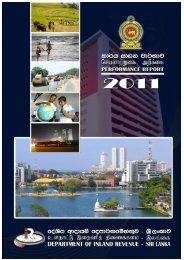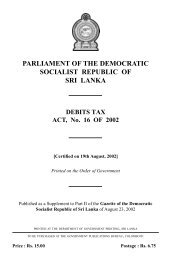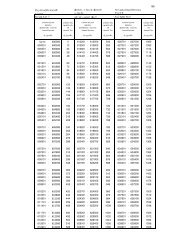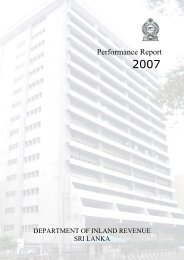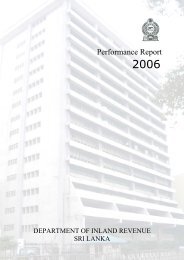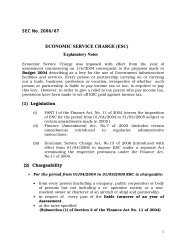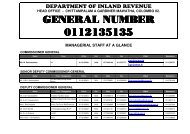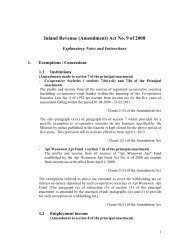VAT Guide to Value Added Tax - sri lanka inland revenue ...
VAT Guide to Value Added Tax - sri lanka inland revenue ...
VAT Guide to Value Added Tax - sri lanka inland revenue ...
Create successful ePaper yourself
Turn your PDF publications into a flip-book with our unique Google optimized e-Paper software.
1.5 What is “supply” ?<br />
<strong>VAT</strong> is not charged on “goods” per-se but on the “supply” of goods/services . Before<br />
charging <strong>VAT</strong> it is therefore necessary <strong>to</strong> identify the “Supply”. The word “supply” is not<br />
synonymous with sale. Even when a trader appropriates business goods for his private<br />
consumption it amounts <strong>to</strong> supply of goods under the principles of <strong>VAT</strong>. As in many<br />
other countries the <strong>VAT</strong> Act does not provide an exhaustive definition for the word<br />
supply. The meaning of supply can be gleaned from the context of the Act, specially from<br />
the definitions given <strong>to</strong> the expressions “Supply of Goods”, “Supply of Service”, “<strong>Tax</strong>able<br />
Activity”, ”<strong>Value</strong> of Supply”, “Time of supply” of etc. It can be said that supply connotes<br />
all types of transactions such as sales, gifts, hires leases or rentals, loans and loan of<br />
goods, exchange of goods & services, processes [i.e making goods from someone else’s<br />
materials Section 5(12)], sales on commission, insurance claims, liquidated<br />
damages,(see para 3.3) fringe benefits <strong>to</strong> employees etc. Even assignment or surrender<br />
of a lease, sale of goodwill are also supplies because, according <strong>to</strong> the definition any<br />
supply which is not a supply of goods is <strong>to</strong> be treated as a supply of service. In<br />
accordance with the principles of <strong>VAT</strong> it can be seen that the legislative intent is <strong>to</strong><br />
subject virtually all types of transactions <strong>to</strong> <strong>VAT</strong>. Thus the Act provides for deemed<br />
supplies as well. Any goods or services held at the time a person ceases <strong>to</strong> be a<br />
registered person is a deemed supply Sec.16(5), Vide Para 4.8(c). The other situations of<br />
deemed supply can be gleaned from Section 5(5)(iv) which implies that appropriation of<br />
goods or services for private use or for any other purpose other than making a taxable<br />
supply tantamounts <strong>to</strong> a supply. The term embraces all things capable of being<br />
supplied for a consideration but the consideration need not be in monetary terms as even<br />
a gift is a supply liable <strong>to</strong> <strong>VAT</strong> if it is made in the course of carrying on or carrying out a<br />
<strong>Tax</strong>able Activity.<br />
Thus identifying the supply is the first thing <strong>to</strong> do before charging <strong>VAT</strong>. If there is no<br />
supply (of goods or services) then there is no <strong>VAT</strong>. For instance when a lessee defaults<br />
payment, the re-possession of the goods by the lessor is not a supply because the goods<br />
belong <strong>to</strong> the lessor. But in the case of a hire-purchase credit sale the goods belong the<br />
buyer and, if the goods are re-possessed by the hire-purchase company for default of<br />
payments by the buyer then such re-possession amounts <strong>to</strong> a “supply of goods” from the<br />
defaulting buyer <strong>to</strong> the hire-purchase company. Similarly a donation made <strong>to</strong> a school<br />
may tantamount <strong>to</strong> a payment in consideration for a “supply” (of service) if it is made in<br />
consideration of some service such as admission of a child. The Exchange gain due <strong>to</strong><br />
exchange rate fluctuations is not a supply.<br />
9


